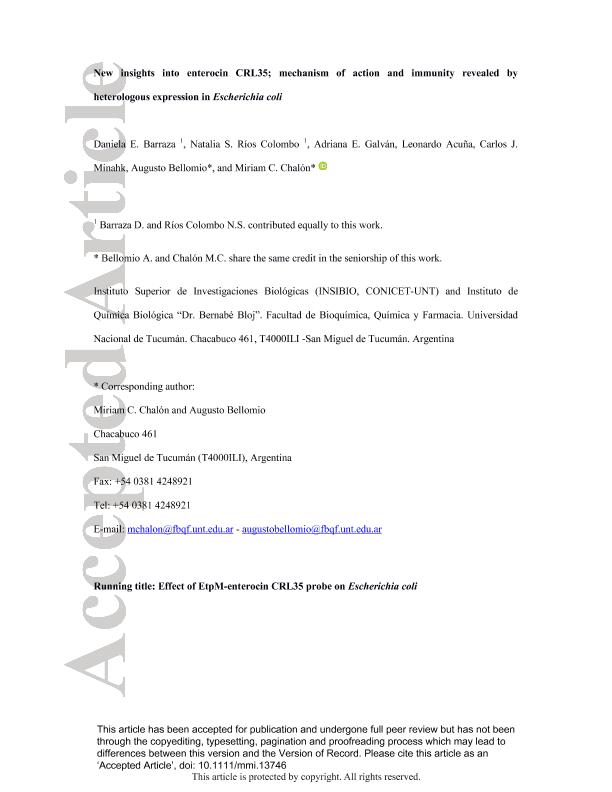Mostrar el registro sencillo del ítem
dc.contributor.author
Barraza, Daniela Estefanía

dc.contributor.author
Ríos Colombo, Natalia Soledad

dc.contributor.author
Galván, Adriana Emilce

dc.contributor.author
Acuña, Leonardo

dc.contributor.author
Minahk, Carlos Javier

dc.contributor.author
Bellomio, Augusto

dc.contributor.author
Chalon, Miriam Carolina

dc.date.available
2018-02-19T17:54:43Z
dc.date.issued
2017-09
dc.identifier.citation
Barraza, Daniela Estefanía; Ríos Colombo, Natalia Soledad; Galván, Adriana Emilce; Acuña, Leonardo; Minahk, Carlos Javier; et al.; New insights into enterocin CRL35: mechanism of action and immunity revealed by heterologous expression in Escherichia coli; Wiley; Molecular Microbiology; 105; 6; 9-2017; 922-933
dc.identifier.issn
0950-382X
dc.identifier.uri
http://hdl.handle.net/11336/36729
dc.description.abstract
The role of the class IIa bacteriocin membrane receptor protein remains unclear, and the following two different mechanisms have been proposed: the bacteriocin could interact with the receptor changing it to an open conformation or the receptor might act as an anchor allowing subsequent bacteriocin insertion and membrane disruption. Bacteriocin-producing cells synthesize an immunity protein that forms an inactive bacteriocin–receptor–immunity complex. To better understand the molecular mechanism of enterocin CRL35, the peptide was expressed as the suicidal probe EtpM-enterocin CRL35 in Escherichia coli, a naturally insensitive microorganism since it does not express the receptor. When the bacteriocin is anchored to the periplasmic face of the plasma membrane through the bitopic membrane protein, EtpM, E. coli cells depolarize and die. Moreover, co-expression of the immunity protein prevents the deleterious effect of EtpM-enterocin CRL35. The binding and anchoring of the bacteriocin to the membrane has demonstrated to be a sufficient condition for its membrane insertion. The final step of membrane disruption by EtpM-enterocin CRL35 is independent from the receptor, which means that the mannose PTS might not be involved in the pore structure. In addition, the immunity protein can protect even in the absence of the receptor.
dc.format
application/pdf
dc.language.iso
eng
dc.publisher
Wiley

dc.rights
info:eu-repo/semantics/openAccess
dc.rights.uri
https://creativecommons.org/licenses/by-nc-sa/2.5/ar/
dc.subject
Bacteriocin
dc.subject
Enterocin Crl35
dc.subject
Suicide Probe
dc.subject
Etpm
dc.subject.classification
Otras Ciencias Biológicas

dc.subject.classification
Ciencias Biológicas

dc.subject.classification
CIENCIAS NATURALES Y EXACTAS

dc.subject.classification
Otras Ciencias Biológicas

dc.subject.classification
Ciencias Biológicas

dc.subject.classification
CIENCIAS NATURALES Y EXACTAS

dc.title
New insights into enterocin CRL35: mechanism of action and immunity revealed by heterologous expression in Escherichia coli
dc.type
info:eu-repo/semantics/article
dc.type
info:ar-repo/semantics/artículo
dc.type
info:eu-repo/semantics/publishedVersion
dc.date.updated
2017-11-03T19:10:17Z
dc.journal.volume
105
dc.journal.number
6
dc.journal.pagination
922-933
dc.journal.pais
Reino Unido

dc.journal.ciudad
Londres
dc.description.fil
Fil: Barraza, Daniela Estefanía. Consejo Nacional de Investigaciones Científicas y Técnicas. Centro Científico Tecnológico Conicet - Tucumán. Instituto Superior de Investigaciones Biológicas. Universidad Nacional de Tucumán. Instituto Superior de Investigaciones Biológicas; Argentina
dc.description.fil
Fil: Ríos Colombo, Natalia Soledad. Consejo Nacional de Investigaciones Científicas y Técnicas. Centro Científico Tecnológico Conicet - Tucumán. Instituto Superior de Investigaciones Biológicas. Universidad Nacional de Tucumán. Instituto Superior de Investigaciones Biológicas; Argentina
dc.description.fil
Fil: Galván, Adriana Emilce. Consejo Nacional de Investigaciones Científicas y Técnicas. Centro Científico Tecnológico Conicet - Tucumán. Instituto Superior de Investigaciones Biológicas. Universidad Nacional de Tucumán. Instituto Superior de Investigaciones Biológicas; Argentina
dc.description.fil
Fil: Acuña, Leonardo. Consejo Nacional de Investigaciones Científicas y Técnicas. Centro Científico Tecnológico Conicet - Tucumán. Instituto Superior de Investigaciones Biológicas. Universidad Nacional de Tucumán. Instituto Superior de Investigaciones Biológicas; Argentina
dc.description.fil
Fil: Minahk, Carlos Javier. Consejo Nacional de Investigaciones Científicas y Técnicas. Centro Científico Tecnológico Conicet - Tucumán. Instituto Superior de Investigaciones Biológicas. Universidad Nacional de Tucumán. Instituto Superior de Investigaciones Biológicas; Argentina
dc.description.fil
Fil: Bellomio, Augusto. Consejo Nacional de Investigaciones Científicas y Técnicas. Centro Científico Tecnológico Conicet - Tucumán. Instituto Superior de Investigaciones Biológicas. Universidad Nacional de Tucumán. Instituto Superior de Investigaciones Biológicas; Argentina
dc.description.fil
Fil: Chalon, Miriam Carolina. Consejo Nacional de Investigaciones Científicas y Técnicas. Centro Científico Tecnológico Conicet - Tucumán. Instituto Superior de Investigaciones Biológicas. Universidad Nacional de Tucumán. Instituto Superior de Investigaciones Biológicas; Argentina
dc.journal.title
Molecular Microbiology

dc.relation.alternativeid
info:eu-repo/semantics/altIdentifier/doi/http://dx.doi.org/10.1111/mmi.13746
dc.relation.alternativeid
info:eu-repo/semantics/altIdentifier/url/http://onlinelibrary.wiley.com/doi/10.1111/mmi.13746/abstract
Archivos asociados
